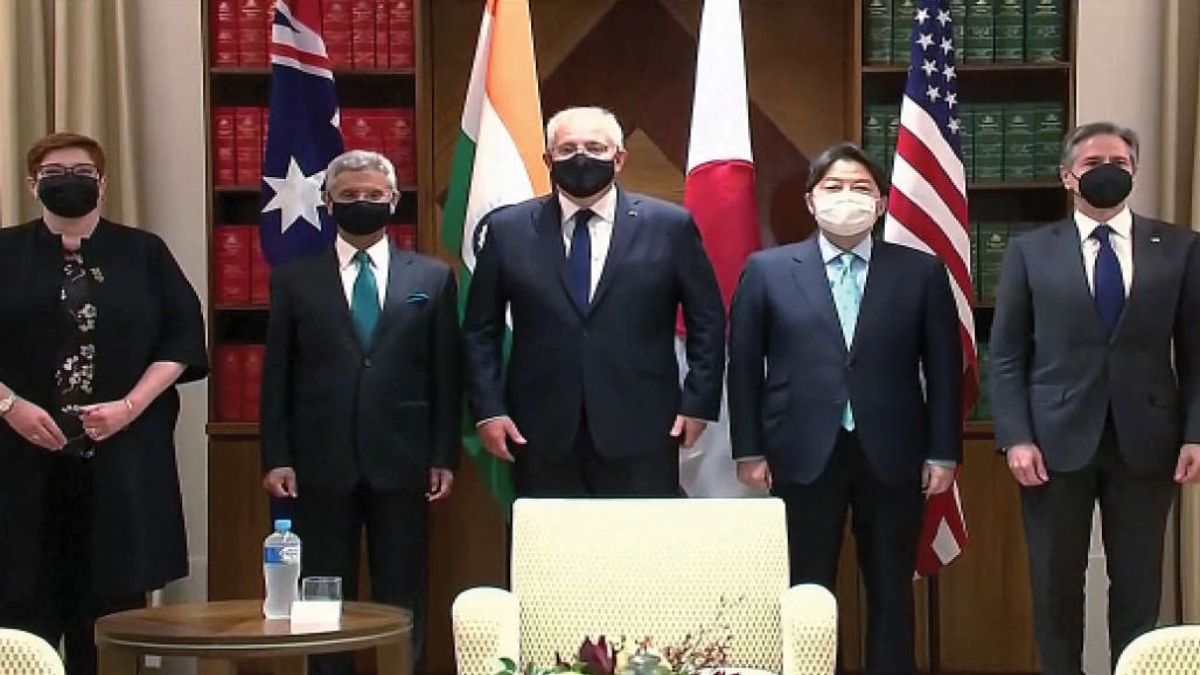


The prospect of Ukraine joining Nato apparently made Vladimir Putin so nervous that he tried to stop that from happening by invading it. This is possibly the most simplistic way of looking at what is happening in Ukraine, because there are enough voices from inside Nato that suggest that the security alliance had no intentions of inviting Ukraine to its fold. While the truth could be somewhere in between what the two sides claim, there is no denying that Vladimir Putin used it to justify his war on Ukraine. In this context, what are the chances of a similar situation developing in the Indo-Pacific, if the People’s Republic of China starts feeling threatened by any move towards the formation of a security alliance in the region? Has Putin’s reaction to the possibility of Nato expansion set the template for expansionist powers? It is said that the world is already at war with the PRC, even though it may not realise it. Compared to Putin’s “bear in the china shop” act, the PRC is insidious; and imperial. Its political warfare is waged 24X7—an unrestricted warfare that operates at several levels. But how soon before political warfare becomes a kinetic conflict, given grabbing of territories is very much a part of Xi Jinping’s plans, with Taiwan and India being the obvious targets?

In such a scenario, what is the future of Quad as a security alliance? And if not a security alliance, what is the relevance of Quad? It was during Donald Trump’s Presidency that his Deputy Secretary of State, Stephen Biegun had said that the United States was trying to formalise the Quad into a Nato-like alliance. There was much commotion at the time, with PRC saying that the Quad was an Asian Nato with its focus on containing Beijing. Perhaps to assuage China, there were vehement denials towards this, particularly from India, which has always been wary of angering China, given the 3,000 km of mostly unmarked “border” it shares with that country. The Quad joint statement of September 2021 issued from White House in the presence of the four Quad leaders, reflected this reticence towards making Quad about China, with no country willing to mention Beijing by name. The absence of any military component from the statement was deliberate. And this in spite of the whole statement being about China. The references were too obvious to be ignored, for example in a statement like this: “Together, we recommit to promoting the free, open, rules-based order, rooted in international law and undaunted by coercion, to bolster security and prosperity in the Indo-Pacific and beyond. We stand for the rule of law, freedom of navigation and overflight, peaceful resolution of disputes, democratic values, and territorial integrity of states.”
It is believed that by not making it appear China focused, the Quad makes it easier for countries in the South China Sea region—that do not want to be caught between the US and China—join the Quad in some sort of a Quad Plus arrangement. It is also believed that South Korea under its new President, Yoon Seok-youl, who is not exactly pro PRC unlike his predecessor, is eager to join the Quad.
But the question still remains: which way is the Quad headed? If health security is one of the cornerstones of the Quad, what action has been taken to bring China to book for spreading worldwide the most devastating pandemic in a century? Nothing until now. Even the US under Joe Biden has not witnessed any significant push towards this. What is being done about the building of supply chain resilience? Without an economic angle, how can any alliance thrive? China’s fears may have been taken care of by ensuring that Quad is not an Asian Nato, but how long can the participating countries pretend that Quad is just a do-gooder alliance and nothing more? If that is the case, how would the Quad define the naval exercises that they regularly participate in? Also, how can they ensure the safety of the sea-lanes without introducing a military component into Quad and formalizing that aspect into an agreement or a treaty? Until now the Quad does not even have a formal agreement or a Quad charter. All it has is just a joint statement. And now President Joe Biden, in his obsession with the Nato and Russia, wants to bring the Ukraine situation on the Quad table, an attempt that India has been rightly resisting.
Ahead of the Tokyo meeting of the Quad leaders, these matters need to be thrashed out by the four countries’ foreign policy establishments. The least they can do is to issue a Quad charter, upholding the democratic values of the countries they comprise, apart from introducing an element of security into the charter, China’s insecurity notwithstanding.